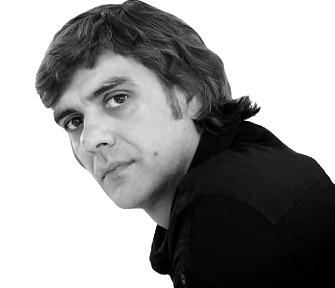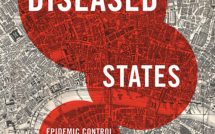

Translated from the B/C/S by Will Firth.
Farewell, Old House
Now, a year and a half after Alija’s funeral, I stood in the courtyard in front of the house where I grew up. I tried to sing Morrissey’s “Late Night, Maudlin Street” in my head, but it sounded schmaltzy, even to me. I said goodbye to the house with that song. I bid it farewell, said ciao, alahimanet, adios, au revoir, but truly, I didn’t feel I was parting with something very important to me. I didn’t know if that was because I’d already parted with the house many times or because it was just a pile of bricks and plaster. Maybe both were true, but now I knew that this was the last time and knew that from now on the house was no longer mine—from now on it really was just a pile of bricks and plaster.
I didn’t know what Morrissey wanted to say in his song, nor did it matter to me anymore. The difference between his and my feeling was probably like that between his Maudlin Street and my Brotherhood and Unity Street. Like the difference between that English house and my Bosnian one here. Between a cup of English tea and a fildžan of Bosnian coffee. Whiskey and slivovitz. Me and Uncle Alija.
There was a difference, but only the blind could see it.
This time I knew I was parting with the house forever and just wanted to satisfy the form of the separation. That’s why I needed this scene, that’s why I needed that song, that’s why I tried to shape the moment. I’d planned everything in detail: I’d say goodbye to the house, go to graveyard, say my farewells to Grandmother and Grandfather, then walk down to the bank of the Sava, cast one last glance, and disappear forever.
I stood and looked in through the non-existent windows. I felt for a moment I could see somebody parting the old, white, holey curtains. I heard them opening a window and letting the morning air into the house.
Grandfather and Grandmother sat, drinking coffee and smoking. I lay on my tummy on the rug eating scrambled eggs and reading Commander Mark, The Great Blek, or Zagor. If we were alone at home, Grandfather and Grandmother let me eat on the floor. When Mom came to visit, I wasn’t allowed to because she said you couldn’t eat on the floor “like a dog.”
“What’s wrong with dogs?” I’d ask.
She never answered.
Grandfather lit two cigarettes and took one out of his mouth and put it in Grandmother’s. Then they smoked like children, without inhaling the smoke into their lungs. They were silent and took occasional sips of coffee from their fildžans. When they drank like that, in silence, it meant Grandfather was going on another trip. Grandfather was a traveling salesman for the Izbor shoe factory. He traveled around with a suitcase full of shoes, which he showed to people in other cities. I felt sorry that Grandfather had to travel and would be away for sever-al days, but at the same time I was glad because he always had something for me when he came back. He always brought something for Grandmother too, but she didn’t like him traveling. She thought he had affairs on those trips, and once he was almost caught red-handed. Grandfather never admitted anything.
I don’t know if Grandfather cheated on Grandmother, but he cheated me countless times. He told me all sorts of lies, too, but I loved him because of it. He cheated me and lied to me because I wanted him to. I don’t know if Grandmother wanted it, but I needed it. Real life was worthless to me, I needed something more, something more beautiful and more exciting than normal life. I needed the Great Blek, Kit Teller, Commander Mark, or Tarzan. Sometimes, for days, I’d be Za-Gor Te-Nay, the spirit with the hatchet from Darkwood. Instead of a stone-bladed hatchet I used Grandmother’s wooden meat tenderizer. When I was Tarzan, I’d go about the courtyard half naked for days. Later on, I took a brown piece of leather from Grandfather’s suitcase of samples and made myself a loincloth like Johnny Weissmüller wore when he played Tarzan. Johnny went mad in his old age and died in a mental hospital, making Tarzan cries.
Once Grandfather brought me a cap from Belgrade like Commander Mark and the Great Blek wore, with a tail at the back. When my dad came to visit he said, “You look great in that Davy Crockett cap.” He had no idea.
Uncle Alija dropped by and happened to see a comic strip. Every time he came after that, he’d ask, “’Ave you got any more of those great stories? I like the guy with the cap best.”
And I always gave them to him, but Grandmother got angry because Alija never gave them back.
When I showed him the cap Grandfather had brought me from Belgrade, I could see the envy in his eyes. He asked me countless times to give it to him, to sell it or loan it, but I didn’t want to. He offered me his fur hat in exchange, his beret, his lighter, cigarettes, everything, but that was the very reason I didn’t want to relinquish it. Later I found the cap boring, but I still didn’t want to give it to him. And maybe he only wanted it because I didn’t want to give it to him.
Before I learned to read, my favorite thing was listening to Grandfather’s stories from his days with the Partisans. They weren’t of the sort: me alone against a hundred Germans. He told me about when they plundered a German food truck and everybody grabbed what they could. He got his hands on a slab of bacon, which he ate without bread, and then got the runs so bad that he shat for three days, nonstop. He told me they were so short of food that they ate beech leaves. Afterward I went out and ate lots of apricot leaves and also got diarrhea. He mentioned a guy from Dalmatia who ate a bellyful of prunes on an empty stomach and had the runs all the way from Foča to Višegrad. He told me how they used to move in single file and had to call out “Next man!” to each other in a muted whisper all the time so they wouldn’t get lost at night in the forest. Once he misheard and thought the comrade in front of him said “Rest if you can,” so he lay down in the mud and instantly fell asleep. He taught me the song “Bandiera Rossa.” And then there were the Italians who ate an Orthodox priest’s black cat near Kotor Varoš. Those were the kinds of stories Grandfather had. And he told them in such a way that I always laughed, though I’d already heard them a thousand times.
And then the Partisan movies ruined everything. Bata Živo- jinović—who killed half the Third Reich single-handedly—was to blame, along with my boyish intellect. The question had to come up sooner or later, with or without Živojinović: “Grand- father, how many Germans did you kill?”
He shook his head.
“Not one?”
“Not one.”
“Well, did you at least wound one?”
“What are you goin’ on about that for, bud? I don’t know. I really don’t know. They fired at me and I fired at them. Look, ’ere’s a thousander, go and buy us each an ice cream, and get a move on. I want chocolate, go on, ’urry up, for Pete’s sake.”
I took the ten-dinar bill that Grandfather still called a “thou- sander,” despite the revaluation, and looked at it with scorn.
As I left, I said, “You were wasting your bullets then.”
To our mutual contentment, I soon discovered comics, so I forgot about the Germans, and my main enemies became the redcoats.
Neither existed anymore now, there was nobody. And this sentimental farewell to the house was really just a poor attempt to assure myself that I’d once existed, that I once used to run about this courtyard with Grandmother’s wooden meat tenderizer and fight the enemy. The black fence at the bottom of the yard was a line of redcoats or a gang of nefarious gunslingers, and the apricot tree was their leader, an infamous bandit, who I’d hurl my stone-bladed hatchet at in the decisive moment with a cry of “Aaaaah!”
Now they were all gone: the apricot tree, the fence, the bumbling redcoats. Grandfather and Grandmother too. Now, in the courtyard, there was only a heap of trash and old iron, remnants of somebody’s furniture, pieces of a smashed toilet bowl. As if somebody had vomited their chewed-up life and left it there to decay as a reminder.
I made a move at last, turned my back on the house, and headed down through the courtyard toward the garden. As I walked through the mud, I tried not to look at the dead trees, which I once used to climb. My gaze fell on the next-door garden that belonged to the late Hasan. I saw a moonscape of holes full of muddy water from the last rain. His wife Fikreta had been searching for him. He was killed at the beginning of the war, but his body was never found. Somebody lied to her that he was interred in the garden.
I left all that behind and went off down the path that, like salvation, led over the muddy ground and far away from the razed houses, withered fruit trees, and dug-up gardens.
This excerpt from FROM NOWHERE TO NOWHERE is published by permission of Sandorf Passage. Copyright © 2020 by Bekim Sejranović. Translation copyright © 2020 by Will Firth.
Published on December 8, 2020.




